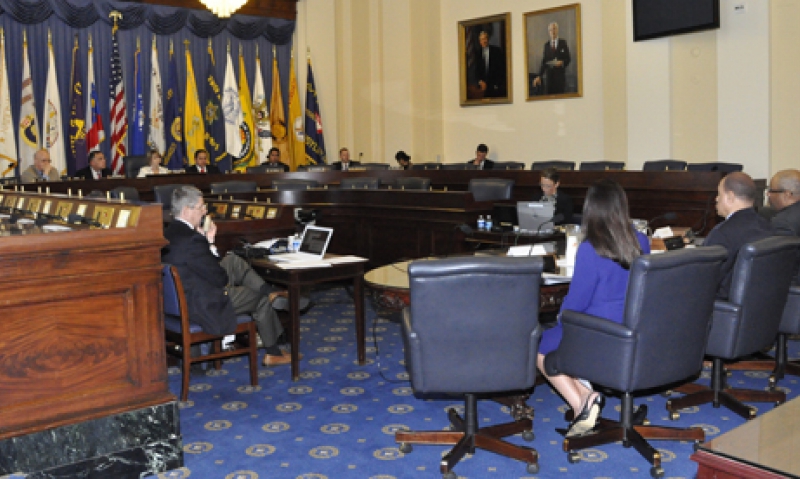
Despite a law passed more than a decade ago, federal contractors are still falling short on using veteran-owned small businesses.
Despite a law passed more than a decade ago, federal agencies are still failing to comply with a key mandate: make sure that small businesses owned by service-disabled veterans get at least 3 percent of all federal contracting dollars.
Testifying April 29 before the House Veterans' Affairs Subcommittee on Economic Opportunity, Joe Sharpe of The American Legion said, "The very men and women who served in uniform, stood ready to fight and - if necessary - die in order to protect and preserve America's free enterprise system, are summarily ignored by the federal agencies responsible for meeting their small business needs."
Sharpe, director of the Legion's Economic Division, has criticized for some time the inability of federal agencies to meet the congressionally mandated goal of awarding 3 percent of their contracts to service-disabled veteran-owned small businesses (SDVOSBs).
"The Department of Defense, who will have the responsibility of directing more than $6.5 billion of stimulus infrastructure, continues to be satisfied with an embarrassing, less-than-1-percent achievement of the federally mandated 3 percent SDVOSB contracting goal," Sharpe told the subcommittee.
Especially important to note, Sharpe explained, is that the stimulus money has been earmarked for construction and infrastructure improvement - two strong suits among SDVOSBs, according to the Federal Central Contractors Registry.
Additional funding from the Army Corps of Engineers and other sources brings the total for military or VA projects to more than $20 billion, according to Sharpe. "The American Legion finds it unconscionable that businesses owned by veterans remain at the back of the line when competing for federal contracts," he told the subcommittee, chaired by Rep. Stephanie Herseth Sandlin, D-S.D. "Last year, The American Legion pointed out that, although the stimulus package included a number of economic development and small business outreach programs, not a dime was specifically targeted toward the development of veteran-owned businesses."
Further emphasizing his point that federal contractors are still dropping the ball when it comes to hiring veteran-owned small businesses, Sharpe quoted from the remarks of Rep. Nydia Velazquez, D-N.Y., at a congressional hearing last March: "Federal agencies missed their small business contracting goals by 2 percent. Procurement officers will tell you that number is negligible, and no big deal. But while a 2-percent shortfall may not sound like a lot, it ultimately cost entrepreneurs $10 billion in missed opportunity."
While The American Legion welcomed the Small Business Administration's decision last March to spend about $1 million in grants to help veterans with their businesses, Sharpe pointed out that SBA has $10 million in discretionary spending. "The American Legion believes a portion of that money needs to be directed toward the (SBA's) Office of Veterans Business Development," Sharpe said, noting that the office "remains crippled and ineffective due to inadequate funding."
"The American Legion feels that this is insufficient and disappointing to America's veteran business owners and clearly undermines the spirit and intent of P.L. 106-50 (Veterans Entrepreneurship and Small Business Development Act of 1999)," Sharpe said. He recommended that fiscal 2010 funding for the Office of Veterans Business Development be increased from its current $2 million to $15 million "in order to implement a nationwide community-based assistance program to veterans and self-employed members of the Reserve and National Guard."
In his testimony, Sharpe listed several recommendations from The American Legion, including:
• Implementation of a coordinated, standardized training program for procurement staff that focuses on SDVOSB procurement strategies in their respective agency.• Reissue by President Obama of Executive Order 13-360, "Providing Opportunities for Service-Disabled Veteran Businesses" to increase federal contracting and subcontracting opportunities for veterans, and make it part of SBA's regulations.• Hold agency leadership responsible for meeting the 3-percent congressionally mandated goal.
The American Legion Small Business Task Force has developed an initiative to challenge the leadership of DoD service components that are not meeting the 3-percent goal.
"We identified the Defense Logistics Agency (DLA) as among the worst-performing organizations in terms of award percentage to SDVOSBs," Sharpe told the subcommittee. Last January, The American Legion requested a meeting with DLA's director, Vice Admiral Alan S. Thompson, and his staff. To date, DLA has not responded.
"Vice Admiral Thompson is a flag officer serving as a director of a DoD agency supporting America's warfighters. However, his organization continues to fail at meeting a congressionally mandated goal aimed at assisting the very community that has sacrificed so much," Sharpe said. He recommended that the subcommittee schedule a hearing with DLA and other federal agencies that consistently fail to meet their procurement goals with SDVOSBs.
- Veterans Business

